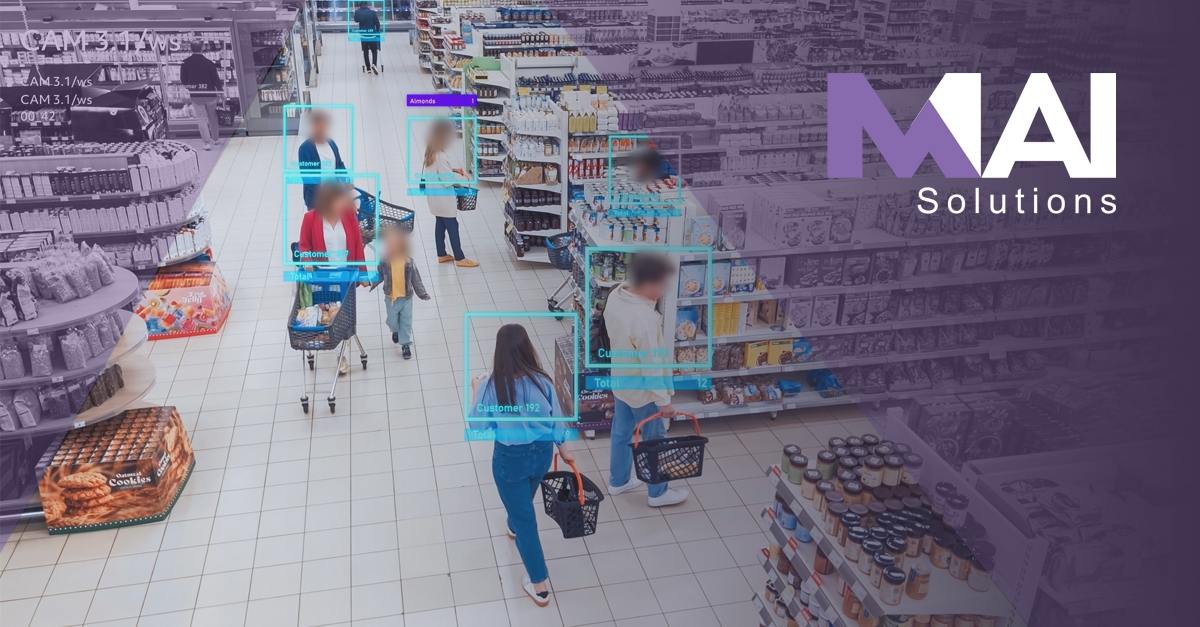
Artificial intelligence in retail has long been discussed as a potential game-changer. But as we move through 2025, the conversation has shifted. AI is no longer just a futuristic concept: it’s here, it’s practical, and it’s transforming retail operations, enhancing customer experiences, and driving measurable ROI. The real question is not whether retailers should adopt AI, but how quickly they can integrate these technologies into their business.
The New Era of Store Intelligence
Product availability has always been one of the most persistent challenges in retail. Ensuring that shelves are stocked and well-organized is critical to both sales and customer satisfaction. Traditionally, this has been a manual, time-consuming process, vulnerable to human error and operational inefficiencies.
AI-powered shelf monitoring systems are changing this. With edge-computing cameras that scan shelves every hour, AI technology can instantly detect issues like out-of-stock products, misplaced items, low stock, spoiled produce, or planogram violations. This real-time data enables store teams to focus on critical actions: improving operational efficiency and the shopping experience for customers.
The impact of AI on product availability is already clear. Stores that have integrated AI-driven shelf management systems have reported over 25% improvement in product availability, leading to a noticeable increase in sales. With labor costs continuing to rise, such automated solutions are no longer a luxury but a necessary component of any modern retail operation.
Shrinkage: A €49 Billion Problem
Shrinkage is a significant challenge across Europe, with retailers losing €49 billion annually due to theft, waste, and operational inefficiencies - approximately 2.05% of total retail turnover. For European retailers, this issue represents not only financial strain but also a barrier to profitability.
AI is stepping in to help address these staggering losses. AI-powered computer vision systems are increasingly being used to monitor both customer and employee behavior in real-time. By tracking items that are picked up but not scanned, these systems immediately alert staff to discrepancies - whether accidental or intentional.
Importantly, AI-driven loss prevention systems maintain customer privacy and seamlessly integrate with existing CCTV infrastructure, meaning they can be deployed rapidly with minimal disruption. This allows retailers to reduce shrinkage without significant upfront costs or changes to store operations.
Smarter Retail Intelligence
AI’s role in retail is far beyond loss prevention. Today’s AI solutions are also transforming the way retailers manage their operations and optimize store performance. Through real-time data collection and analysis, AI can track foot traffic, optimize store layouts, generate heatmaps, and even assist store teams in prioritizing tasks based on current conditions.
By integrating with electronic shelf labels and workforce management systems, AI can help retailers adjust pricing, promotions, and staff schedules dynamically. This synchronization not only improves margins but also reduces waste and inefficiencies.
Furthermore, as AI-driven systems evolve, the cost of deployment continues to decrease. For example, the cost of running advanced AI models has dropped significantly: from $20 per million tokens in 2022 to $0.07 per million tokens in 2024. This reduction in cost, paired with more powerful AI models, makes these solutions increasingly viable for retailers of all sizes, unlocking new operational efficiencies on scale.
So, Why Isn’t AI Everywhere?
The short answer is that change is challenging. Retailers are often constrained by entrenched processes, tight margins, and risk aversion. Shifting away from long-standing operational strategies requires careful consideration, even when the return on investment is clear.
However, the financial and operational pressures on retailers are only increasing. According to a recent survey of Europe’s top retailers, over 70% now view AI as a transformative force in their operations. Shrinking margins, increasing labor costs, and the growing need for operational efficiency are driving retailers to rethink traditional methods and turn to AI for solutions.
As AI systems continue to mature and deliver results, the case for adoption has become undeniable. Retailers are moving from “should we?” to “how soon can we implement it?”
M.A.I. Solutions: AI for Retail That Works
At M.A.I. Solutions, we offer AI-powered solutions designed to address the critical challenges retailers face:
- Loss Prevention: Advanced computer vision detects discrepancies between items picked up and items scanned at checkout, reducing shrinkage without disrupting the customer experience.
- Autonomous Retail: Delivering seamless, frictionless shopping experiences while maintaining complete control over inventory and store operations.
- Retail Intelligence: Providing actionable insights into stock levels, store performance, and customer behavior to optimize decision-making and improve operational efficiency.
Our solutions integrate seamlessly with your existing infrastructure, ensuring quick deployment and minimal disruption. They are designed to scale with your business, providing measurable results from day one.
AI-driven tools are helping retailers address rising shrinkage, labor costs, and increasing customer expectations. With M.A.I. Solutions, you’ll gain the expertise, technology, and support you need to drive smarter, more profitable operations.
Contact us today to unlock the full potential of AI and transform your retail operations, at sales@mai.hr .
 Back to the list
Back to the list
